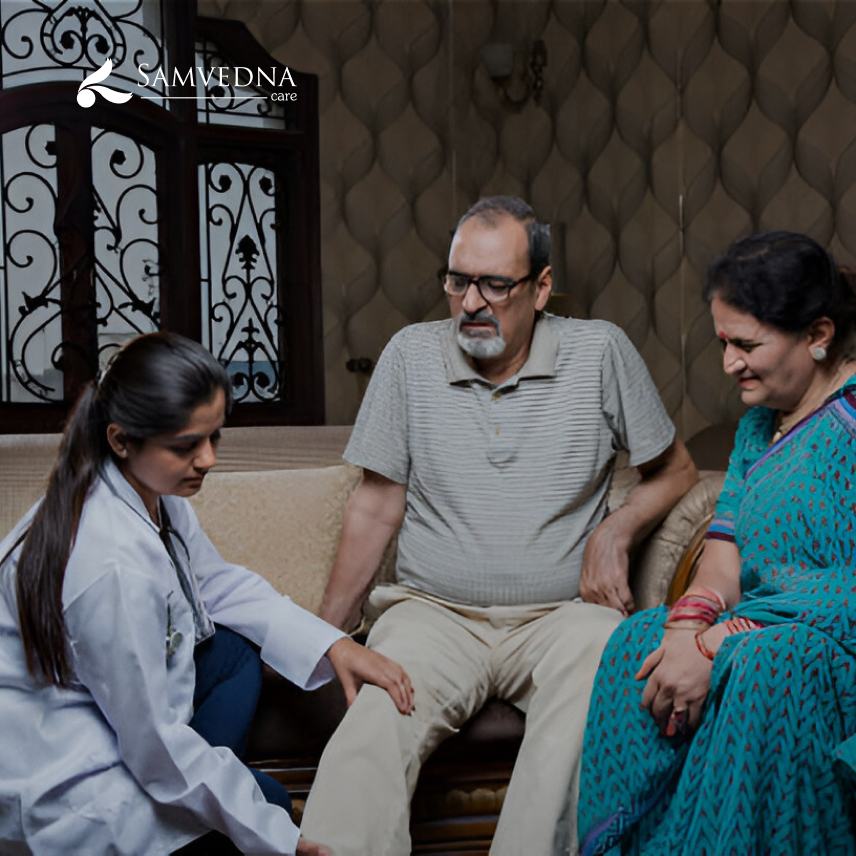Aging makes it increasingly important to take care for both our physical and cognitive health. Older adults often face many challenges, including a higher risk of falls and cognitive decline. At Samvedna Care, we believe that understanding the connection between these issues is vital to providing the best dementia care services.
In this blog, we will explore how falls and cognitive decline are linked, why this matters and how early dementia diagnosis and proper care can make a difference.
Why Older Adults are Prone to Falls
Falls are common among older adults because as people get older, their muscles get weaker, bones become fragile and their balance and reflexes slow down. Vision problems and certain medications can also increase the risk of falling. Falls can lead to serious injuries such as fractures, head trauma and can eventually lead to loss of independence. But apart from physical harm, falls may also be connected to the brain’s health, especially in people experiencing cognitive decline.
Understanding Cognitive Decline and Dementia
Cognitive decline refers to a gradual loss of brain functions such as memory, thinking skills, attention and problem solving. It can range from mild forgetfulness to more serious conditions like dementia. Dementia is a group of symptoms that affect memory, thinking and social abilities severely enough to interfere with daily life.
Recent studies have shown that walking is not just an automatic physical activity. It requires higher level cognitive functions like planning, attention and decision making. This means that as cognitive abilities decline, the brain becomes less efficient at coordinating movements, increasing the risk of falls.
- Poor Balance and Coordination: Cognitive decline affects how the brain processes movement and balance, leading to instability.
- Difficulty Paying Attention: People with cognitive impairment may not notice hazards or may struggle with dual tasking, such as walking while talking.
- Memory Loss: Forgetting to use assistive devices or take precautions can raise the risk of falling.
- Medication Side Effects: Many people with dementia take medications that may cause dizziness or drowsiness.
- Reduced Physical Activity: Lack of activity due to cognitive decline leads to muscle weakness and poor coordination.
- Underlying Brain Changes: The same brain changes that cause dementia can also affect motor control and balance.
The Vicious Cycle: How Falls Can Accelerate Cognitive Decline
Not only does cognitive decline increase the risk of falling, but frequent falls themselves can actually speed up cognitive deterioration. Every fall, especially those that cause injury or hospitalization, can lead to reduced mobility, isolation and depression. These outcomes limit brain stimulation and physical activity both of which are essential for maintaining cognitive health. Additionally, the stress and trauma from falls may negatively affect brain function, leading to faster memory loss, confusion and loss of independence.
In short, falls and cognitive decline can create a vicious cycle where one leads to the other, and both worsen over time if not properly addressed. So, understanding the connection between falls and cognitive decline is crucial for:
- Early Detection: Repeated falls might be an early sign of cognitive impairment and should prompt a professional dementia diagnosis.
- Tailored Care: Awareness of this link helps families and healthcare providers create better care plans that address both physical safety and mental health.
- Injury Prevention: Preventing falls helps reduce hospitalizations, delays the need for full time care and improves overall quality of life.
If you’re caring for an older adult, here are simple yet effective steps to reduce fall risks and support brain health:
- Schedule Regular Check-Ups: Monitor cognitive and physical health regularly.
- Make the Home Safer: Remove loose rugs, improve lighting and install handrails.
- Encourage Exercise: Activities like walking, stretching and balance exercises can help.
- Watch Medications: Some drugs may cause confusion or dizziness so consult a doctor regularly.
- Stay Mentally and Socially Engaged: Social interaction and brain exercises can slow cognitive decline.
- Promote a Balanced Diet: Good nutrition supports brain and bone health.
How Samvedna Care Supports Older Adults in Preventing Falls and Cognitive Decline
At Samvedna Care, we understand the challenges that come with aging, especially when it involves cognitive decline and the risk of falls. We provide trained professional caregivers who are experienced in offering compassionate and personalized support for the elderly. Our caregivers assist with daily activities while closely monitoring for any signs of cognitive changes or physical difficulties that may increase fall risk. We also guide families in making important environmental changes that significantly reduce the chances of falls. By combining expert care with a safer living environment, Samvedna Care ensures that older adults receive the comprehensive support they need to live more securely and comfortably.

 +91 74280 97301
+91 74280 97301



